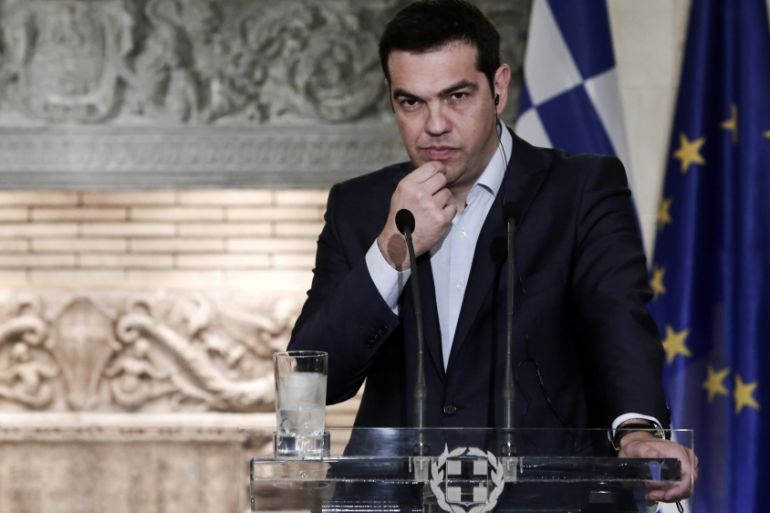Greece and creditors trade barbs ahead of crucial talks
Failing to reach a deal would hurt not only Greek economy but also rest of Europe, officials on both sides warn.

Greece and its European Union creditors have been trading criticisms just a day before crucial negotiations in Luxembourg, the failure of which could result in the country’s exit from the eurozone.
Greek Prime Minister Alexis Tsipras has described demands by the country’s rescue lenders to slash pensions “incomprehensible”, while EU officials say their compromise proposals already lean towards Greece’s side.
Keep reading
list of 4 itemsGeorgia’s ‘foreign agents’ bill: What’s the controversy about? What’s next?
What’s at stake in next month’s European elections?
EU to drop rule-of-law dispute with Poland
EU Commission Vice President Valdis Dombrovskis said on Wednesday, a day before Thursday’s crucial talks in Luxembourg, that Greece should offer a more realistic plan instead of complaining about the proposals made by the creditors.
“It is important that the Greek side actually not only communicates what they do not want to do, but also what they do want to do,” he said.
Greece needs more loans from its creditors before June 30, when its bailout programme expires and it is scheduled to make a debt repayment worth about $1.8 bn to the International Monetary Fund (IMF). The creditors want Greece to make economic reforms but Athens is baulking.
If no deal is reached, Greece would face “dramatic” economic consequences, the country’s own central bank has warned.
Meanwhile, Michel Sapin, France’s finance minister on Wednesday described a possible failure of negotiations as “very serious for Greece but also extremely serious for the European project”.
RELATED: Tsipras accuses creditors of trying to humiliate Greece
Some EU member states are increasingly seeing a Greek exit, or Grexit, as a possibility, Dombrovskis acknowledged.
“We are in the middle of June. By end of June, the current programme expires and there are of course some discussions also on less favourable scenarios,” he said.
To prevent the breakdown, Greece’s Tsipras said the creditors had to offer “an honourable compromise”.
Tsipras’ five-month-old left-wing government wants new terms for its bailout programme after previous administrations imposed draconian spending cuts and tax increases for five years. Those austerity measures helped reduce the public deficit but ravaged the economy and made most Greeks poorer.
EU officials said they had already lowered their demands for a primary budget surplus this year from three percent to one percent and agreed to make the increase in the surplus over the next years more gradual. A primary surplus is how much a government earns when not counting the costs of interest payments on debt.
And in response to Tsipras’ insistence that creditors were seeking to financially choke pensioners, Pierre Moscovici, the EU’s financial affairs commissioner, said the EU “wants to make sure that people who don’t have much of a pension still get that pension”.
To make further budget cuts, EU officials have been calling on Athens to slash defence spending instead.
Greece has fallen back into a mild recession and market concerns are growing about a default. That is evident in a rise in its sovereign borrowing rates – the interest rate on the country’s two-year bond surged on Wednesday to above 30 percent.